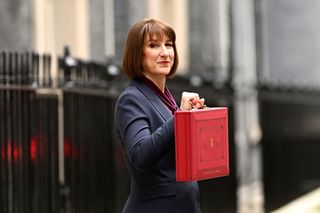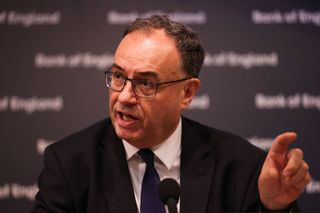Refresh
Thank you for joining us on our live blog today. We will be back with further analysis tomorrow morning ahead of the MPC decision at midday. Have a lovely evening!
How has the FTSE 100 performed today?
The FTSE 100 opened higher this morning in response to the US election outcome, but has since fallen back as investors digest the full implications of a Trump win. By market close, the index was pretty much level with yesterday.
Trump has threatened to impose additional tariffs on imported goods. Tariffs often disrupt supply chains and can prove inflationary.
According to widely-quoted research from the National Institute of Economic and Social Research (NIESR), UK inflation could be 3-4 points higher over the next two years if Trump imposes the tariffs that have been threatened. Interest rates could be 2-3 points higher.
The FTSE 100 has largely been driven by the US election outcome today.
(Image credit: Karl Hendon via Getty Images)
How will equity markets respond to a rate cut?
Rate cuts are generally good news for equity markets, as they ease borrowing costs for businesses and can help invigorate the economy, boosting earnings. However, markets tend to price this sort of information into valuations in advance.
Investors don’t just focus on a single event, but consider how quickly and how dramatically central banks will cut rates over a period of time.
They also look at how one region’s rate path compares to others worldwide.
Why a base rate reduction doesn’t always result in a cut in mortgage rates
Many homeowners and first-time buyers will be crossing their fingers for a base rate cut, believing that it will feed through to lower mortgage rates.
However, Nick Mendes, mortgage technical manager at the broker John Charcol, says a drop in the base rate won’t necessarily result in an immediate reduction in mortgage rates. “When setting their rates, lenders take multiple elements into account, including their service levels, swap rates, and overall market conditions,” he explains.
Mendes adds that after the MPC’s decision, the Bank of England governor’s statement and voting patterns will be analysed, and if the outlook suggests fewer cuts ahead, swap rates may rise. “This could lead to higher mortgage rates even after a Bank rate cut.”
Mortgage rates have risen following last week’s Autumn Budget, with lenders like HSBC, Coventry Building Society and Virgin Money hiking their rates.

Around 1.6 million borrowers are due to re-mortgage this year as their fixed-rate deals expire.
(Image credit: Seksan Mongkhonkhamsao via Getty Images)
What about mortgage rates?
Mortgage rates have fallen significantly from their peak last summer, and came down further in the aftermath of the base rate cut on 1 August. Despite this, they remain higher today than they have been for much of the past decade.
The average two-year fixed rate is currently 5.40%, according to Moneyfacts. The average five-year rate is 5.11%.
Currently, savers may find better rates on cash ISAs than regular savings accounts.
- Best easy-access ISA: The Trading 212 and Moneybox Cash ISAs both pay 5.17%.
- Best easy-access savings account: The Cahoot Sunny Day Saver and the Chip Easy-Access Saver both pay 5%.
Although fixed rates are slightly lower than easy-access rates at the moment, they offer savers a guaranteed rate. This could prove advantageous when interest rates fall further. Meanwhile, the variable rate on an easy-access account can be slashed at any time.
- Best one-year fixed account: The Atom Bank One-Year Fixed Saver pays 4.8%.
Savings rates – should you fix?
Savings rates have been on a downward trend after peaking last year. Providers reduced their rates in anticipation of cuts from the Bank of England, with further cuts following after the MPC lowered the base rate on 1 August.
Rates are likely to tumble further if the MPC cuts the base rate tomorrow, meaning it could make sense to fix your savings to lock in a higher rate for longer.
The top providers are still offering rates of around 5% (or just under) on their easy-access and one-year fixed accounts. However, these deals are becoming increasingly rare so you may need to act quickly. Shopping around will help you secure the best deal.
See our round-up of the best easy-access and one-year fixed-rate savings accounts.

Fixing your savings could help you lock in higher rates for longer – but remember that you won’t be able to access your cash until the fixed period ends.
(Image credit: Talaj via Getty Images)
What does it mean for your personal finances?
Mortgage holders – especially those due to refix – are desperately hoping for interest rates to fall further. Savers may be less keen, although they will be pleased to see a lower rate of inflation.
Let’s take a closer look at the implications policy can have on your back pocket.
Back-to-back cuts in November and December now look less likely
“After Thursday’s meeting, we don’t expect fireworks anytime soon with the MPC settling into a quarterly cutting cycle, with the next cut expected in February,” Matthews says.
Longer term, he says that markets have already tempered their expectations and are now forecasting two or three cuts in 2025, down from previous projections of four of five.
How many MPC meetings are left in 2024?
There are only two MPC meetings left this year – tomorrow and 19 December. Before the Autumn Budget, markets were set on a November rate cut with some experts saying they thought a consecutive cut would follow in December. Is a December cut now out of the question?

Will those hoping for a pre-Christmas rate cut be disappointed?
(Image credit: Karl Hendon via Getty Images)
A close decision?
“Following the recent upheaval in bond markets after last week’s Budget, we expect a close 5-4 vote in favour of a 25 basis point cut at Thursday’s MPC meeting,” says Steve Matthews, liquidity investment director at Canada Life Asset Management.
“Since the last meeting in September, when rates were held, economic growth and inflation data have softened, though not enough to shift the MPC’s current cautious approach.”
How much harm can a little red box do?
The independent Office for Budget Responsibility (OBR) said it expects Budget policy measures to “increase inflation by 0.4 percentage points at their peak effect in 2026”.
Meanwhile, economists at consultancy Capital Economics have adjusted their forecasts upwards by 0.2% and 0.1% in 2025 and 2026 respectively.
“The Budget won’t reignite inflation. But it will keep it a little hotter for a little longer than previously looked likely,” chief UK economist Paul Dales told MoneyWeek.

Not exactly an inflation genie, but the little red box could still give the Bank of England pause for thought.
(Image credit: Photo by Leon Neal/Getty Images)
Enter the Budget
Since then, the Autumn Budget has created a bit of a hiccup. Some of the measures announced by chancellor Rachel Reeves are likely to prove inflationary.
Reeves announced plans to increase government spending by £70bn annually – an attempt to avoid cuts to public services and to fund investment projects.
She also unveiled £40bn in tax hikes, with a large part of this being funded by an increase in employer National Insurance contributions. The concern is that businesses will pass this cost on to consumers by putting their prices up.
Plans to increase the National Living Wage by 6.7% from April could also contribute to inflation by keeping wage growth high.
Time for some aggression?
Everything was shaping up nicely for a November rate cut, particularly in light of comments made by the governor of the Bank of England last month. Andrew Bailey told The Guardian that UK policymakers could become a “bit more aggressive” with rate cuts if inflation continues to cool.

Governor of the Bank of England, Andrew Bailey
(Image credit: Photographer: Hollie Adams/Bloomberg via Getty Images)
What about the services sector?
More significantly, services inflation also slowed from 5.6% to 4.9% in September, coming in comfortably below the Bank of England’s 5.5% forecast.
The MPC has been watching this figure closely, as the services sector accounts for around 80% of UK economic output. Services inflation has been particularly sticky in previous reports, suggesting an ongoing problem with inflationary pressures in the domestic economy.
Inflation below target in September
September’s inflation report moved the dial in favour of a November rate cut. The Consumer Prices Index (CPI) came in at 1.7% on an annual basis in September. This was the slowest rate of inflation in over three years, coming in below the Bank of England’s 2% target.
It is worth remembering that prices were rising by around 11% when inflation peaked a couple of years ago. We have made significant progress from that point.

The largest downward contribution to the monthly change in CPI in September came from the transport sector. Air fares fell by 34.8%. Petrol and diesel prices also fell by 5.5p and 6p per litre respectively.
(Image credit: Witthaya Prasongsin via Getty Images)
Will the MPC cut rates tomorrow?
Markets are confident that rates will be cut by 25 basis points tomorrow, taking the base rate to 4.75%. But we won’t know for sure until the announcement is made.
When the MPC last met in September, the committee voted to hold rates by a decisive 8-1 majority. Have there been enough economic developments over the past seven weeks to persuade four members to change their vote? Let’s take a closer look.
Good Wednesday morning, it’s Katie Williams and Ruth Emery here reporting from MoneyWeek’s live blog. Interest rate day is almost upon us. At midday tomorrow, the MPC will announce whether it has decided to cut rates or keep them on ice at 5%.
Stay with us as we bring you the latest forecasts in the lead-up to the announcement. We’ll also be analysing what each result could mean for your personal finances.

